Why read?
Reading is life! I am an unapologetic bookwormand I attribute my success in learning English to my insatiable appetite for reading. In addition, by reading books about doctors and medicine, I have gained insight into the medical world and have learned a myriad of new words and expressions that helped me do my job of a medical interpreter.
As I wrote in this post, where I recommend that medical interpreters watch TV shows in order to improve their medical vocabulary and get some interpreting practice, stimulating input is a key factor in learning. And chances are, if you are a medical interpreter (or are thinking about becoming one), you are interested in medicine. This is where books about medicine come in! Please note that the books I`m talking about are not medical textbooks on anatomy and such, and neither are they novels set in hospitals. I’m talking about books about medicine and medical providers, often written in the form of memoirs. Such books are a perfect source of the following:
- general insight into the world of medicine and medical training
- information on diseases, symptoms, treatments, complications, and outcomes
- medical vocabulary, which can be general or specialized depending on the book
- interpreting skills practice (see the section on audiobooks below for more details on how to practice).
This post is all about English-language books. For a list of books in Russian, head here.
What to read?
The following list of books is by no means exhaustive – these are simple some of my favorite books. I’m providing links to these books on Amazon because in many cases you can read a sample chapter or even listen to some of the book and decide if you like it. Simply click on the title of the book to follow the link to Amazon, then click on ‘Look inside’ at the top of the cover photo to read a sample chapter or click on ‘Listen’ below the cover photo to listen to a sample chapter.

The Real Doctor Will See You Shortly: A Physician’s First Year
I listened to this book non-stop! There was one episode that made me mad – when the author communicated with a Spanish-speaking patient without an interpreter andd failed to recognize how much pain the patient was in, and he was then buffled at the telling off he recieved from his supervisor, not seeming to learn from this experience – I hope this is not the case!
From Amazon: In medical school, Matt McCarthy dreamed of being a different kind of doctor—the sort of mythical, unflappable physician who could reach unreachable patients. But when a new admission to the critical care unit almost died his first night on call, he found himself scrambling. Visions of mastery quickly gave way to hopes of simply surviving hospital life, where confidence was hard to come by and no amount of med school training could dispel the terror of facing actual patients.This funny, candid memoir of McCarthy’s intern year at a New York hospital provides a scorchingly frank look at how doctors are made, taking readers into patients’ rooms and doctors’ conferences to witness a physician’s journey from ineptitude to competence.

Catch Your Breath: The Secret Life of a Sleepless Anaesthetist
This book was very easy to read – it’s genuinly funny and well-written!
From Amazon: Ed Patrick is an anaesthetist. Strong drugs for his patients, strong coffee for him. But it’s not just sleep-giving for this anaesthetist, as he navigates emergencies, patients not breathing for themselves and living with a terrifying sense of responsibility. It’s enough to leave anyone feeling numb. But don’t worry, there’s plenty of laughing gas to be had.

In my opinion, this book should be read by every medical provider, medical interpreter and interpreter trainer. This book describes the disastrous miscommunication that happened between the hospital staff and a Hmong family in the absence of trained interpreters or other professionals capable of acting as culture brokers. The consequences of these gaps in mutual understanding were heart-breaking, from the child being placed in foster care due to parents’ non-compliance with the medication regimen, to far-reaching health concerns. The book also provides a fascinating insight into the history and the culture of the Hmong people. I enjoyed this book thoroughly and had difficulty putting it down.
From Amazon: The Spirit Catches You and You Fall Down explores the clash between a small county hospital in California and a refugee family from Laos over the care of Lia Lee, a Hmong child diagnosed with severe epilepsy. Lia’s parents and her doctors both wanted what was best for Lia, but the lack of understanding between them led to tragedy. Winner of the National Book Critics Circle Award for Nonfiction, the Los Angeles Times Book Prize for Current Interest, and the Salon Book Award, Anne Fadiman’s compassionate account of this cultural impasse is literary journalism at its finest. The current edition, published for the book’s fifteenth anniversary, includes a new afterword by the author that provides updates on the major characters along with reflections on how they have changed Fadiman’s life and attitudes.

The Surgeons: Life and Death in a Top Heart Center
This, in fact, was the first book about medicine I read. I discovered it at the height of my obsession with Grey’s Anatomy and was thrilled to find a book that portrayed real-life doctors and patients. I liked it that the author is not the doctor himself, so the way he talks about medicine (and there is a very informative appendix with drawings and explanations of how the heart works) is easy to understand and follow. The author organized the book in a great way – he would start by telling about an operation/procedure that he witnessed and then talk about the history and/or issues related to this surgery.
From Amazon: The Surgeons follows the team at one of the world’s premier cardiac surgery and transplant centers. Given unprecedented access, Charles R. Morris recounts in thrilling detail a late-night against-the-clock “harvest run” to secure a precious transplantable organ, the heartbreaking story of a child’s failed transplant, and more. Along the way, Morris reflects on how doctors really think, rising health care costs, and the future of health care in America.

Written by Dr. Jeremy Groopman, this book provides valuable insight into doctor’s decision making, with examples of both errors in judgment and life-saving diagnoses made in the face of confusing evidence. Groopman uses his own experience as a doctor and a patient as well as interviews with his colleagues.
From Amazon: On average, a physician will interrupt a patient describing her symptoms within eighteen seconds. In that short time, many doctors decide on the likely diagnosis and best treatment. Often, decisions made this way are correct, but at crucial moments they can also be wrong — with catastrophic consequences. In this myth-shattering book, Jerome Groopman pinpoints the forces and thought processes behind the decisions doctors make. Groopman explores why doctors err and shows when and how they can — with our help — avoid snap judgments, embrace uncertainty, communicate effectively, and deploy other skills that can profoundly impact our health. This book is the first to describe in detail the warning signs of erroneous medical thinking and reveal how new technologies may actually hinder accurate diagnoses. How Doctors Think offers direct, intelligent questions patients can ask their doctors to help them get back on track.
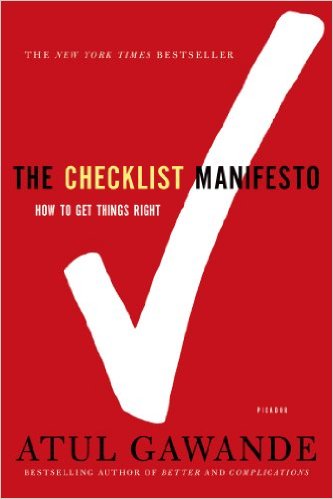
The Checklist Manifesto: How to Get Things Right
I know the title of this book does not make it seem terribly exciting, but trust me: it’s worth reading! I first heard about this book in an episode of my favorite podcast, the Hidden Brain. In this book, Dr. Atul Gawande talks about what is arguably on the best medical inventions: a checklist, and how it can help improve outcomes in medicine and avoid disasters. The book is not very long and can be read in a couple of sittings. I have great respect for Dr. Gawande for his candor in describing his own errors and for writing an immensely readable book about a seemingly unexciting subject.

Cook County ICU: 30 Years of Unforgettable Patients and Odd Cases
From Amazon: An inside look at one of the nation’s most famous public hospitals, Cook County, as seen through the eyes of its longtime Director of Intensive Care, Dr. Cory Franklin. Filled with stories of strange medical cases and unforgettable patients culled from a thirty-year career in medicine, Cook County ICU offers readers a peek into the inner workings of a hospital. Author Dr. Cory Franklin, who headed the hospital’s intensive care unit from the 1970s through the 1990s, shares his most unique and bizarre experiences, including the deadly Chicago heat wave of 1995, treating some of the first AIDS patients in the country before the disease was diagnosed, the nurse with rare Munchausen syndrome, the first surviving ricin victim, and the famous professor whose Parkinson’s disease hid the effects of the wrong medication. Surprising, darkly humorous, heartwarming, and sometimes tragic, these stories provide a big-picture look at how the practice of medicine has changed over the years, making it an enjoyable read for patients, doctors, and anyone with an interest in medicine.
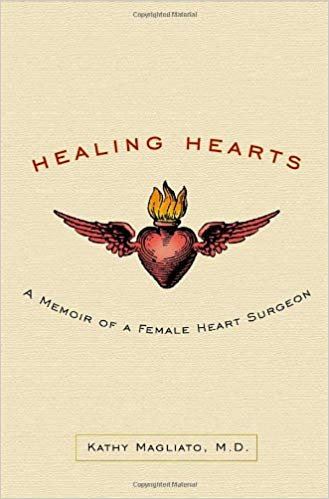
Healing hearts: A Memoir of a Female Heart Surgeon
I loved that this book talks about women in medicine – both on the doctor side of things and the patient. One example I remember vividly is how different women’s symptoms of a heart attack can be and how it can lead to heart attacks being undiagnosed or caught too late.
From Amazon: An inspiring, surprising, sometimes shocking, and ultimately deeply informative memoir of the high-stakes, high-pressured life of a female heart surgeon
Dr. Kathy Magliato is one of the few female heart surgeons practicing in the world today. She is also a member of an even more exclusive group—those surgeons specially trained to perform heart transplants. Healing Hearts is the story of the making of a surgeon who is also a wife and mother. Dr. Magliato takes us into her highly demanding, physically intense, male-dominated world and shows us how she masterfully works to save patients’ lives every day.
In her memoir, we come to know many of those patients whose lives Dr. Magliato has touched: a baby born with a hole in her heart, a ninety-four-year-old woman with a lethal tear in her aorta, and a thirty-five-year-old movie producer who saves her own life by recognizing the symptoms of a heart attack. Along the way, Dr. Magliato sheds light on the too often unrecognized symptoms of a heart attack and cardiovascular disease—the number one killer of women in America—and the specific measures that can be taken to prevent it.

When the Air Hits Your Brain: Tales from Neurosurgery
I`ll be honest, some of the cases described in the book were pretty graphic, so it is not for the faint-hearted. But if you are all about Dr. Derek Shepherd, read on!
From Amazon: With poignant insight and humor, Frank Vertosick Jr., MD, describes some of the greatest challenges of his career, including a six-week-old infant with a tumor in her brain, a young man struck down in his prime by paraplegia, and a minister with a .22-caliber bullet lodged in his skull. Told through intimate portraits of Vertosick’s patients and unsparing yet fascinatingly detailed descriptions of surgical procedures, When the Air Hits Your Brain―the culmination of decades spent struggling to learn an unforgiving craft―illuminates both the mysteries of the mind and the realities of the operating room.

Medicine in Translation: Journeys with My Patients
Dr. Ofri acknowledges the role of a patent’s culture and potential language barriers in healthcare. I also enjoyed reading her personal experience of being in a foreign country.
From Amazon: For two decades, Dr. Danielle Ofri has cared for patients at Bellevue, the oldest public hospital in the country and a crossroads for the world’s cultures. In Medicine in Translation she introduces us, in vivid, moving portraits, to her patients, who have braved language barriers, religious and racial divides, and the emotional and practical difficulties of exile in order to access quality health care. Living and dying in the foreign country we call home, they have much to teach us about the American way, in sickness and in health.
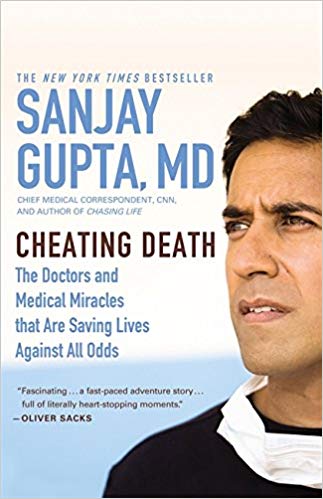
Cheating Death: The Doctors and Medical Miracles that Are Saving Lives Against All Odds
Dr. Gupta is not just another celebrity doctor. He’s a brilliant writer and researcher.
From Amazon: In this riveting book, Dr. Sanjay Gupta–neurosurgeon, chief medical correspondent for CNN, and bestselling author–chronicles the almost unbelievable science that has made these seemingly miraculous recoveries possible. A bold new breed of doctors has achieved amazing rescues by refusing to accept that any life is irretrievably lost. Extended cardiac arrest, “brain death,” not breathing for over an hour–all these conditions used to be considered inevitably fatal, but they no longer are. Today, revolutionary advances are blurring the traditional line between life and death in fascinating ways.
Drawing on real-life stories and using his unprecedented access to the latest medical research, Dr. Gupta dramatically presents exciting accounts of how pioneering physicians and researchers are altering our understanding of how the human body functions when it comes to survival–and why more and more patients who once would have died are now alive. From experiments with therapeutic hypothermia to save comatose stroke or heart attack victims to lifesaving operations in utero to the study of animal hibernation to help wounded soldiers on far-off battlefields, these remarkable case histories transform and enrich all our assumptions about the true nature of death and life.
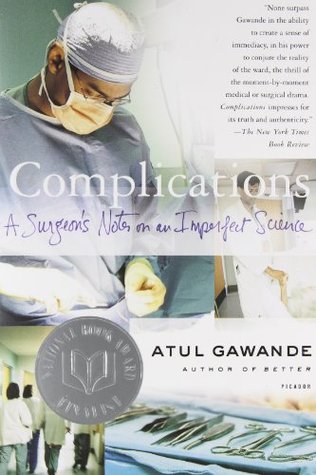
Complications: A Surgeon’s Notes on an Imperfect Science
You`ll notice that it is the second book by Dr. Gawande in this list, and with good reason: he writes with complete honesty about the limitations of medicine and the imperfection of the people who practice it.
From Amazon: In gripping accounts of true cases, surgeon Atul Gawande explores the power and the limits of medicine, offering an unflinching view from the scalpel’s edge. Complications lays bare a science not in its idealized form but as it actually is–uncertain, perplexing, and profoundly human.
Complications is a 2002 National Book Award Finalist for Nonfiction.
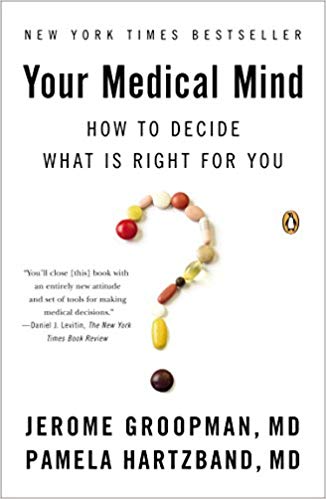
Your Medical Mind: How to Decide What Is Right for You
Dr. Groopman makes another appearance with the list. Aside from learning a lot about medicine, I found this book helpful for me personally as an occasional receiver of medical care.
From Amazon: Making the right medical decisions is harder than ever. We are overwhelmed by information from all sides—whether our doctors’ recommendations, dissenting experts, confusing statistics, or testimonials on the Internet. Now Doctors Groopman and Hartzband reveal that each of us has a “medical mind,” a highly individual approach to weighing the risks and benefits of treatments. Are you a minimalist or a maximalist, a believer or a doubter, do you look for natural healing or the latest technology? The authors weave vivid narratives of real patients with insights from recent research to demonstrate the power of the medical mind. After reading this groundbreaking book, you will know how to arrive at choices that serve you best.

The Body Keeps the Score: Brain, Mind, and Body in the Healing of Trauma
My best friend was adamant that I had to read this book – and she was right!
In “The Body Keeps the Score,” Dr. Bessel van der Kolk, an eminent trauma expert, illustrates how trauma significantly alters both the body and the brain. This change affects individuals’ abilities to experience pleasure, connect with others, regulate emotions, and develop trust. He delves into innovative therapies—ranging from neurofeedback and meditation to activities like sports, drama, and yoga—that activate the brain’s innate capacity for change, providing new avenues for recovery.
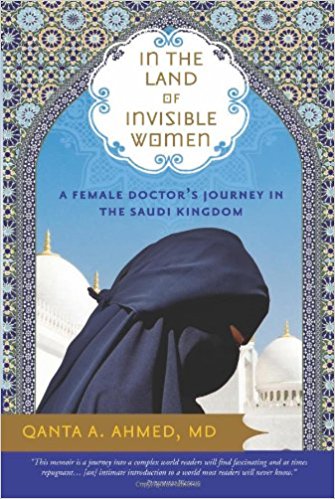
In the Land of Invisible Women: A Female Doctor’s Journey in the Saudi Kingdom
This book is more about culture than medicine, but I found it fascinating.
From Amazon: Unexpectedly denied a visa to remain in the United States, Qanta Ahmed, a young British Muslim doctor, becomes an outcast in motion. On a whim, she accepts an exciting position in Saudi Arabia. This is not just a new job; this is a chance at adventure in an exotic land she thinks she understands, a place she hopes she will belong.
What she discovers is vastly different. The Kingdom is a world apart, a land of unparalleled contrast. She finds rejection and scorn in the places she believed would most embrace her, but also humor, honesty, loyalty, and love.
And for Qanta, more than anything, it is a land of opportunity. A place where she discovers what it takes for one woman to recreate herself in the land of invisible women.
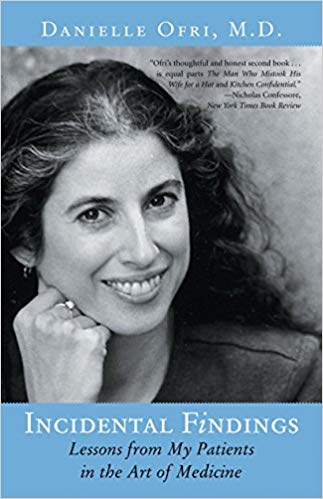
Incidental Findings: Lessons from My Patients in the Art of Medicine
From Goodreads: The book opens with a dramatic tale of the tables being turned on Dr. Ofri: She’s had to shed the precious white coat and credentials she worked so hard to earn and enter her own hospital as a patient. She experiences the real ‘prick and pressure’ of a long needle as well as the very real sense of invasion and panic that routinely visits her patients.
These fifteen intertwined tales include ‘Living Will, ‘ where Dr. Ofri treats a man who has lost the will to live, and she too comes dangerously close to concluding that he has nothing to live for;’Common Ground, ‘ in which a patient’s difficult decision to have an abortion highlights the vulnerabilities of doctor and patient alike;’Acne, ‘ where she is confronted by a patient whose physical and emotional abuse she can’t possibly heal, so she must settle on treating the one thing she can, the least of her patient’s problems; and finally a stunning concluding chapter, ‘Tools of the Trade, ‘ where Dr. Ofri’s touch is the last in a woman’s long life.

The Year THEY Tried to Kill Me: Surviving a surgical internship…even if the patients don’t
In addition to being pretty informative, this book was also pretty funny!
From Amazon: “The only people who think you are a doctor are you and your mom.? Not exactly the warm welcome I hoped for. But I was just a naive Wisconsin boy, fresh out of medical school and new to Oakland, California. I chose Highland Hospital for my surgical internship: an entire year filled with sick patients, brutal work hours, more brutal staff surgeons, and flawed attempts to maintain a long-distance relationship. Yet, somehow, it?s a work of nonfictional comedy. I take on many roles throughout the story. I’m a kid who still plays Tetris, a guy who can?t commit to his girlfriend, an untrained doctor who finds himself cutting open people?s skulls, and a fish out of water who is called to the ER to drain the blood from a cocaine-engorged penis. But this adventure isn’t just crazy hospital anecdotes or what it takes to become a surgeon. It’s a coming of age tale about learning what it means to be a caregiver. Sure, I worked 40 hours without sleep, but that is only one of the ways they tried to kill me. Their real evil was crushing the enthusiasm and compassion of their trainees. I struggled to remain a normal human while joining a fraternity of holier-than-thou surgeons, and nothing grounded me more than trying to cope with the illnesses within my own family. If this book proves anything, it’s that “Laughter is the best medicine, but surgery is a close second.” Enjoy.
On the advice of the blog’s readers, made in the comments to my Facebook post about this article, I`m adding the following two book:
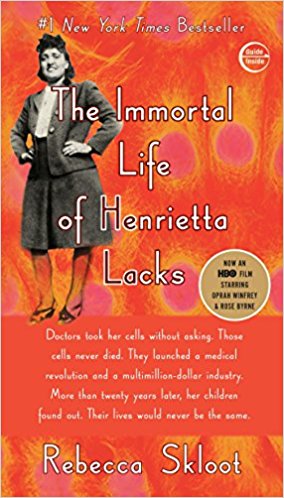
The Immortal Life of Henrietta Lacks
Similarly to the Checklist Manifesto, I first became familiar with this story through a podcast. In fact, there are several podcasts dedicated to Henrietta Lacks and her immortal cells: this one, this one, this one and this one. And there is even a movie based on the book!
From Amazon: Her name was Henrietta Lacks, but scientists know her as HeLa. She was a poor black tobacco farmer whose cells—taken without her knowledge in 1951—became one of the most important tools in medicine, vital for developing the polio vaccine, cloning, gene mapping, and more. Henrietta’s cells have been bought and sold by the billions, yet she remains virtually unknown, and her family can’t afford health insurance. This phenomenal New York Times bestseller tells a riveting story of the collision between ethics, race, and medicine; of scientific discovery and faith healing; and of a daughter consumed with questions about the mother she never knew.
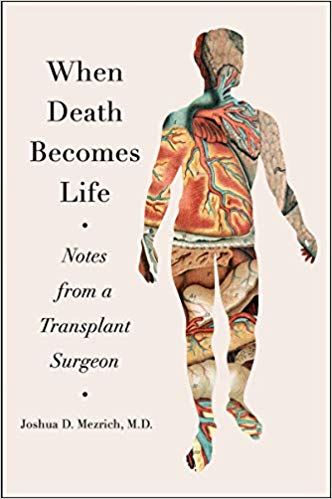
When Death Becomes Life: Notes from a Transplant Surgeon
This book lets you see what happens inside the OR during transplant surgery. Dr. Joshua Mezrich connects the history of transplants with modern-day practices and talks about his own journey that brought him to where he is.
When Death Becomes Life is a thrilling look at how science advances on a grand scale to improve human lives. Mezrich examines more than one hundred years of remarkable medical breakthroughs, connecting this fascinating history with the inspiring and heartbreaking stories of his transplant patients.
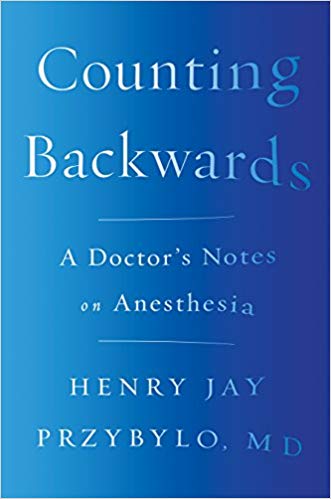
Counting Backwards: A Doctor’s Notes on Anesthesia
In Counting Backwards, Dr. Henry Jay Przybylo—a pediatric anesthesiologist with more than thirty years of experience—delivers an unforgettable account of the procedure’s daily dramas and fundamental mysteries. Przybylo has administered anesthesia more than 30,000 times in his career—erasing consciousness, denying memory, and immobilizing the body, and then reversing all of these effects—on newborn babies, screaming toddlers, sullen teenagers, even a gorilla. With compassion and candor, he weaves his experiences into an intimate exploration of the nature of consciousness, the politics of pain relief, and the wonder of modern medicine.
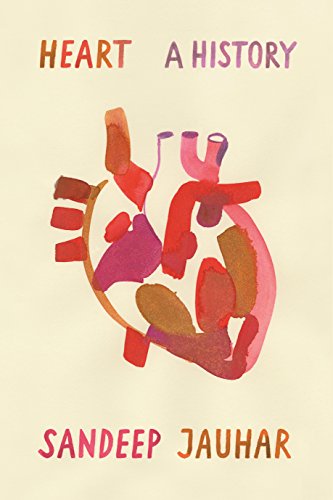
For centuries, the human heart seemed beyond our understanding: an inscrutable shuddering mass that was somehow the driver of emotion and the seat of the soul. As the cardiologist and bestselling author Sandeep Jauhar shows in Heart: A History, it was only recently that we demolished age-old taboos and devised the transformative procedures that have changed the way we live.
Deftly alternating between key historical episodes and his own work, Jauhar tells the colorful and little-known story of the doctors who risked their careers and the patients who risked their lives to know and heal our most vital organ.
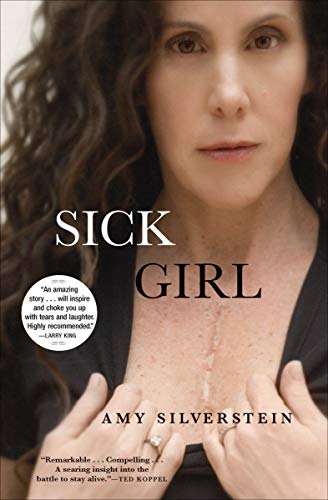
At twenty-four, Amy Silverstein was your typical type-A law student: smart, driven, and highly competitive. With a full course load and a budding romance, it seemed nothing could slow her down. Until her heart began to fail. In this book, Amy chronicles her medical saga from the first misdiagnosis to her astonishing and ongoing recovery. Her memoir is made all the more dramatic by the deliriously romantic bedside courtship with her future husband, and her uncompromising desire to become a mother.
Distrustful of her doctors and insistent in her refusal to be the “grateful heart patient” she is expected to be, Amy presents a patient’s perspective that is truly eye-opening and even controversial. Amy’s shocking honesty and irreverent humor allow the reader to live her nightmare from the inside—an unforgettable experience that is both painfully disturbing and utterly compelling.

Elizabeth Ford went through medical school unsure of where she belonged. It wasn’t until she did her psychiatry rotation that she found her calling—to care for one of the most vulnerable populations of mentally ill people, the inmates of New York’s jails, including Rikers Island, who are so sick that they are sent to the Bellevue Hospital Prison Ward for care.
These men were broken, unloved, without resources or support, and very ill. They could be violent, unpredictable, but they could also be funny and tender and needy. Mostly, they were human and they awakened in Ford boundless compassion. Her patients made her a great doctor and a better person and, as she treated these men, she learned about doctoring, about nurturing, about parenting, and about love.
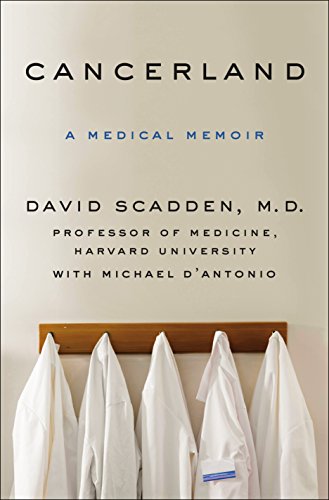
What is it like to encounter cancer? How does it feel to face the unknown, to enter a world of hope, loss, and dread?
From the diagnosis of his childhood friend’s mother to his poignant memories in the lab, David Scadden’s seen the unknown world of cancer from the lens of a young boy, a classmate, a researcher, a friend, a doctor, and a neighbor. Scadden chronicles his personal memories of cancer – his visits to his sick neighbor and his classmate who left school and never came back.
Now Dr. David Scadden, co-founder of the Harvard Stem Cell Institute and one of the world’s leading experts on immunology and oncology, writes his memoir, Cancerland, with Pulitzer Prize-winning journalist Michael D’Antonio. With riveting stories and moving compassion, Scadden and D’Antonio paint a still rapidly changing landscape in the context of all too common stories of loss. Ranging from Scadden’s personal childhood memories to his triumphs and regrets as a doctor, Scadden illuminates a light at the end of a dark tunnel.
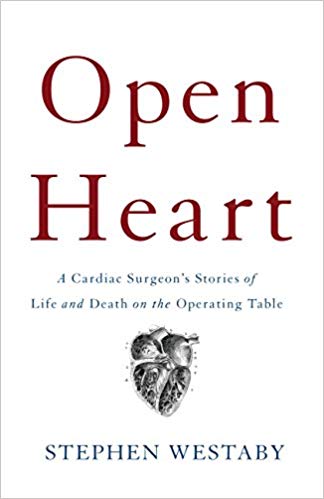
Open Heart: A Cardiac Surgeon’s Stories of Life and Death on the Operating Table
When Stephen Westaby witnessed a patient die on the table during open-heart surgery for the first time, he was struck by the quiet, determined way the surgeons walked away. As he soon understood, this detachment is a crucial survival strategy in a profession where death is only a heartbeat away. In Open Heart, Westaby reflects on over 11,000 surgeries, showing us why the procedures have never become routine and will never be. With astonishing compassion, he recounts harrowing and sometimes hopeful stories from his operating room: we meet a pulseless man who lives with an electric heart pump, an expecting mother who refuses surgery unless the doctors let her pregnancy reach full term and a baby who gets a heart transplant-only to die once it’s in place.
What else to read?
As I said above, these are some of my favorite books and there are dozens if not hundreds more books that cover a variety of subjects written by nurses, paramedics, surgeons, psychotherapists, and other medical providers. If you would like to keep reading, you can find more lists here and here
Happy reading!
More Resources for Medical Interpers
- For resources related to idioms for medical idioms click here and here.
- For a collection of resources for medical interpreters, click here.
- To learn about self-care for medical interpreters, click here.
- For practice activities for developing your note-taking skills, click here.
- For ideas on glossary building, click here.
- For a list of podcasts related to medicine in English, see here.
- For recommendations for TV shows medical interpreters, click here.
- For recommendations for Russian-language podcasts and medical books click here and here.
- For a list of blogs, podcasts and YouTube channels for interpreters, click here.
More about the author: About Yuliya Speroff
Interested in my interpreter training services and would like to collaborate? Read more about the workshops I am able to offer in Interpreter Training
Want to get in touch? Contact me
The Medical Interpreter Blog is a participant in the Amazon Services LLC Associates Program, an affiliate advertising program designed to provide a means for sites to earn advertising fees by advertising and linking to amazon.com.

Leave a Reply